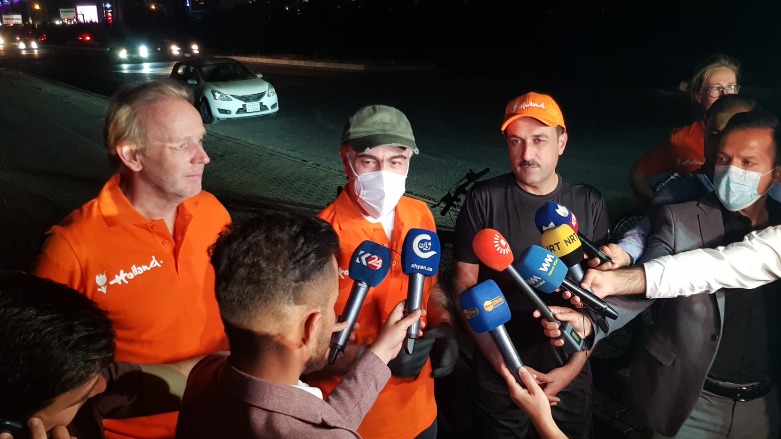Dutch, Kurdish officials promote cycling at inauguration of new bike lane in Erbil

ERBIL (Kurdistan 24) – On Thursday evening, Dutch diplomats and Kurdish officials inaugurated a new cycling lane and drove on it wearing orange shirts and caps, the national color of the Netherlands.
The Dutch Consul General in Erbil, Hans Akerboom, was joined by Safeen Dizayee, the Head of the Foreign Relations Department of the Kurdistan Regional Government (KRG), and Omid Khoshnaw, the governor of Erbil province, to inaugurate the new cycling lane in Erbil to promote the activity. Kurdish activist Dashni Morad also attended the event.
The Erbil government built the new cycling lane along a major street in the city known as the 100 Meter road and designed and financed by Dr. Sarbaz Najib. The path’s length is around 250-300 meters and it is one meter wide.
Read More: Erbil sees new dedicated bicycle lane as part of city pilot program
“What you see here today is [the] first bike path in Erbil, and as the Netherlands, we are very happy,” Akerboom told Kurdistan 24. “We are the champions in bike paths, and we have around 32,000 kilometers of bike path in the Netherlands.”
He explained that there are around 23 million bicycles in the Netherlands, a country of around 17 million people. “So almost every family or every person in the Netherlands has a bike, and what’s important is that a bike is healthy.”
He also underlined its importance for the environment. “So, please people in Kurdistan, use the bike.”
“In the past, Kurdistan was isolated and there was no opportunity to reach the outside world,” Dizayee stated. But now, “it's important for us to learn from other cultures” while preserving “our own identity and heritage.”
Along with @nlinkri CG and Erbil Governor, we inaugurated the 1st bicycle lane in Erbil. Thanks to @jtmakerboom for the arrangement & Dr. Sarbaz Najib for the design, financing of the project.
— Safeen Dizayee (@SafeenDizayee) May 6, 2021
I hope this will encourage similar initiatives for a cleaner & healthier environment. pic.twitter.com/ORXjtg7w2K
He expressed his hope that more people pick up cycling as a hobby and to try to “keep the environment clean and pollution-free.”
Today I joined the @nlinkri in Hewler to promote cycling at the new bicycle lane for a cleaner and healthier environment. We need more bicycles instead of cars! @jtmakerboom @maaikekeizer #cycling #HealthyLife #greencity #Kurdistan pic.twitter.com/dqhSwmvd9Y
— Dashni Morad (@Dashni_Morad) May 6, 2021
Dutch-Kurdish artist and humanitarian activist Dashni Morad told Kurdistan 24 during the event that Erbil is suffering from air pollution and the effects of climate change.
She added that Erbil as a city “is designed for cars and motorcycles, not bicycles.”
Despite large numbers of avid cyclists in Erbil, the city has no infrastructure, and many often fear being hit by motorists on its notoriously busy roadways.
“It is known that air pollution is responsible for a mortality rate between five to ten times higher than road accidents,” Morad said.
“And cities with a high level of pedestrian and cycling accessibility have GDP per capita levels 38% higher than cities dominated by traffic, simply because of healthier people.”
“So, to create a livable city we must make bicycles as a common mode of transport,” she concluded.
Editing by Khrush Najari
